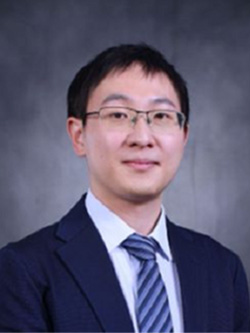THE THIRD INTERNATIONAL SYMPOSIUM
ON THERMAL-FLUID DYNAMICS 2022
(ISTFD 2022 )

THE THIRD INTERNATIONAL SYMPOSIUM
ON THERMAL-FLUID DYNAMICS 2022
(ISTFD 2022 )

Lin CHEN
Institute of Engineering Thermophysics, Chinese Academy of Sciences, China
University of Chinese Academy of Sciences, China
Email: chenlinpkucoe@gmail.com; chenlin2018@iet.cn
Tel: +86-10-82545735/18610509260
Dr. Lin Chen is now a full professor in the Institute of Engineering Thermophysics, Chinese Academy of Sciences and jointly at the University of Chinese Academy of Sciences, China. He is currently one Board member of Experts Commission of China Energy Society. He obtained his B.E and PhD in Mechanics (Energy and Resources Engineering) from Peking University. He was previously a JST-CREST and JSPS Research Fellow and an Assistant Professor in Tohoku University, Japan. His current research topics include energy resources, supercritical fluids, soil remediation, advanced measurement technologies. In recent years, he has authored over 160 well-cited international journal papers and/or conference presentations, 16 patents and 7 chapters, 3 books, including the most famous one on energy conversion (“Handbook of Research on Advancements in Supercritical Fluids Applications for Sustainable Energy Systems”, IGI Global, 2021, 821 pages). He revealed the heat transfer laws and stability conditions of supercritical fluid based natural circulation, which is in the TOP5 most-cited list of Elsevier. Recently, he is focused on CO2 based energy system and utilization processes. He is a winner of the President Scholarship, National Scholarship (MOE), Elite Scholar (PKU) and many other honors/awards. He was the winner of the Young Scholar Award of the Asian Union of Thermal Science and Engineering (AUTSE) in 2018 due to his contribution in supercritical fluid thermodynamics. He is currently an Associate Editor of the ASME Journal of Nuclear Engineering and Radiation Science and an Editorial Board member of the Journal of Supercritical Fluids (Elsevier).
Title: Near-Critical Fluid Thermodynamics: Fluctuation and Parameter Scaling Behaviors
Abstract: Supercritical carbon dioxide (sCO2) Brayton cycle shows obvious advantages (e.g. higher efficiency, compact system design, etc.) compared with traditional Rankine cycle for high temperature thermal sources due to the special physical properties of CO2 near the critical points. Though it is generally considered suitable for a wide range of applications including power generation systems and has become a very hot topic, real system efficiency is still a problem, for the physical parameters matching challenges of sCO2 working fluid. For sCO2 Brayton cycle, the inlet parameters, especially for the main compressor inlet temperature, have significant effect on the system performance. This talk is focused on the fundamental thermodynamic parameter scaling process during crossing critical and crossing pseudocritical heating/cooling. The basic cross-critical and pseudo-critical molecular dynamics simulation has been conducted to recall the fluctuation phenomena in such regions, which shows the possibility of efficient compressing process as one way of reaching a stable inlet. In the second part, an asymptotic model has been established to capture the role of near-critical properties for the understanding of transient origins of fluid transport physics, especially in the boundary layers. The asymptotic solutions show that the boundary layers are mainly governed by the diffusion effect (sensitive to spatial gradients) while exhibiting the wave character in bulk. Transient temperature and pressure results show that as the fluids flow across the boundary layers to the bulk, acoustic wave process is associated to that of specific energy transportation process.